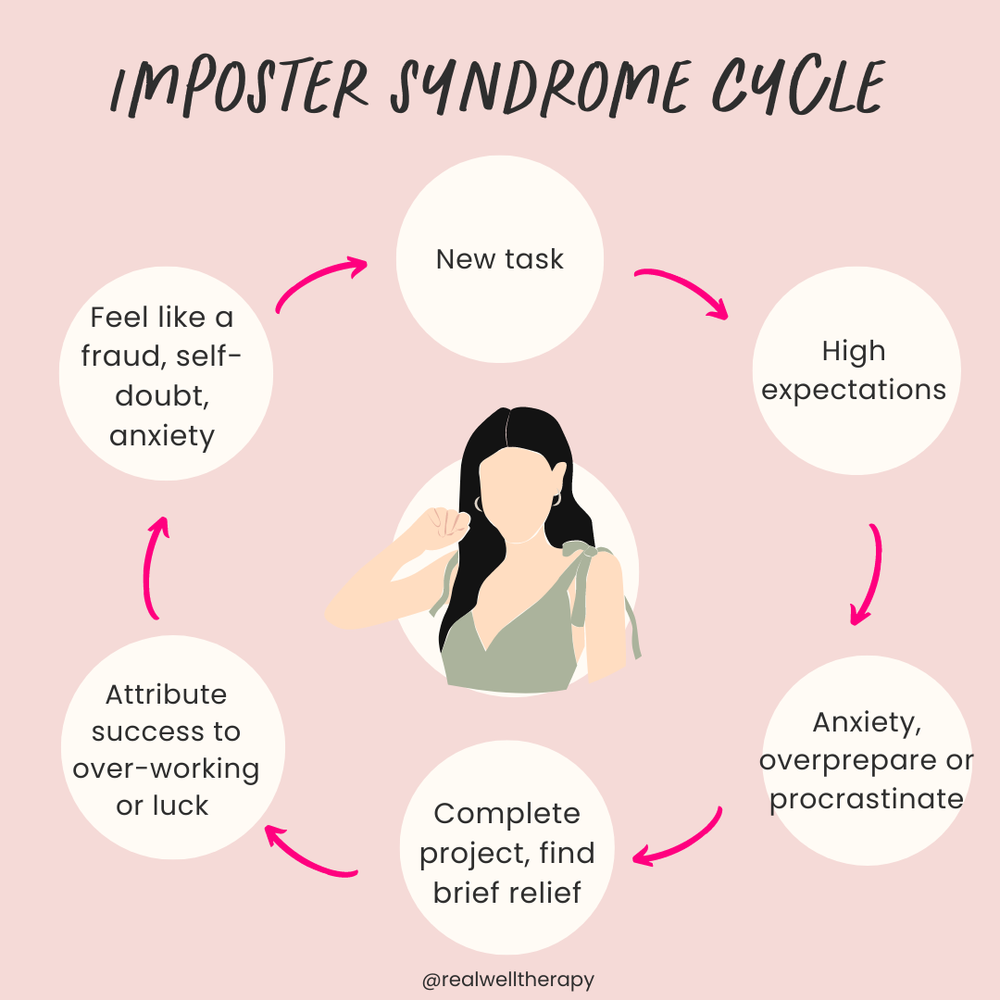Anxiety and Imposter Syndrome: Understanding Their Connection
Do you ever start your day feeling like you're just moments away from being "found out"? Or lie awake at night replaying all the ways you might have come up short, convincing yourself that you're just lucky to be where you are in life? Welcome to the club!
You're not just spinning your wheels, this intersection of anxiety and imposter syndrome is a familiar crossroads for many. Together, they form a mental loop that whispers doubts and amplifies fears, making even your achievements feel undeserved. But here's the heartening truth: understanding the link between these feelings is your first step toward learning how to manage anxiety and imposter syndrome.
What Are Anxiety and Imposter Syndrome?
Before we dive into how these two experiences interact, let's take a moment to understand what each one means.
Anxiety: More Than Just Worry
Anxiety is more than just feeling worried. It's a persistent feeling of unease, fear, or dread that can affect your daily life. Some common signs of anxiety include:
- Constant worry about various aspects of life
- Difficulty concentrating
- Restlessness or feeling on edge
- Physical symptoms like rapid heartbeat or sweating
It's like your mind is constantly on high alert, making it hard to relax or feel at ease in various situations.
Imposter Syndrome: Feeling Like a Fraud
Do you sometimes feel like you don't deserve your achievements or that you've somehow fooled everyone into thinking you're more competent than you are? That's imposter syndrome talking.
Imposter syndrome is the persistent belief that you're not as capable as others perceive you to be. It's characterized by:
- Doubting your abilities or accomplishments
- Feeling like a "fraud" despite evidence of your success
- Attributing your accomplishments to luck or external factors
The Link Between Anxiety and Imposter Syndrome (and How to Manage Them)
Anxiety and imposter syndrome often play off each other, feeding a cycle that can be challenging to break. Let's explore how these two experiences interact and reinforce each other.
Persistent Self-Doubt
At the core of both anxiety and imposter syndrome is a deep-seated self-doubt. This doubt can manifest in various ways:
- Questioning your abilities even in areas where you've demonstrated competence
- Constantly seeking validation from others
- Difficulty accepting compliments or praise
You might succeed at work, but you still question whether you belong there. This persistent self-doubt can fuel anxiety about your performance and reinforce feelings of being an imposter.
Comparison and Perfectionism
Both anxiety and imposter syndrome can drive you to constantly compare yourself to others and strive for perfection. This often looks like:
- Holding yourself to impossibly high standards
- Feeling inadequate when you perceive others as more successful
- Obsessing over minor mistakes or flaws in your work
Do you often feel that your work is never quite good enough? These beliefs can increase your anxiety and strengthen the belief that you're not as capable as others think you are. Learn more about perfectionism and how to overcome it in this blog post.
Fear of Failure
Anxiety often amplifies the fear of failure, which is a central component of imposter syndrome. This fear can:
- Prevent you from taking on new challenges
- Lead to procrastination or over-preparation
- Increase stress and worry about potential negative outcomes
The dread of making mistakes or not meeting expectations can lead to significant stress, reinforcing feelings of being a "fraud" or not good enough.
Overthinking and Rumination
Anxiety often involves overthinking and rumination about past and future events. This mental pattern aligns closely with imposter syndrome:
- Replaying past interactions or performances, focusing on perceived shortcomings
- Worrying excessively about future tasks or challenges
- Difficulty shutting off your mind, especially at night
Do you find yourself replaying conversations or events in your mind, analyzing every detail? This overthinking can keep you in a loop of worrying about your abilities and legitimacy, reinforcing both anxiety and imposter syndrome.
Social Anxiety and Perceived Judgment
Social anxiety can significantly contribute to imposter syndrome and vice versa. This connection often manifests as:
- Fear of being "exposed" as inadequate in social or professional settings
- Difficulty speaking up and sharing your needs or opinions
- Isolation and missed moments for connection (check out this blog post for more on the impact of anxiety on your social life).
The fear that others will judge you can make social situations particularly stressful, feeding into both your anxiety and feelings of being an imposter.
Avoidance Behaviors
Both anxiety and imposter syndrome can lead to avoidance behaviors, such as:
- Turning down opportunities for growth or advancement
- Procrastinating on important tasks
- Avoiding feedback or fearing criticism, even when constructive
While these behaviors might provide short-term relief, they ultimately reinforce your anxieties and imposter feelings, limiting personal and professional growth.
Bottom Line
Anxiety and imposter syndrome often go hand in hand, creating a challenging cycle of self-doubt and fear. However, by understanding this connection and learning how to overcome imposter syndrome and anxiety, you can break the cycle of self-doubt.
Therapy Can Help You Manage Anxiety and Imposter Syndrome
If you're struggling with anxiety and imposter syndrome, professional support can make a significant difference. As a therapist specializing in anxiety treatment for women and teens in Austin, Texas, I offer tailored strategies to help you:
- Manage anxiety symptoms effectively
- Challenge negative and imposter syndrome thoughts
- Embrace imperfection and learn from mistakes
- Build genuine confidence in your abilities
- Develop healthier thought patterns and behaviors
Ready to work on managing your anxiety and imposter syndrome? Let's talk. Call 512-686-7009 or schedule a free consultation online here. Together, we can develop strategies to help you feel more confident, capable, and authentic in all areas of your life.
Don’t miss out! Sign up below for blog updates.
(Don’t worry, I won’t spam you or share your information).


